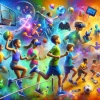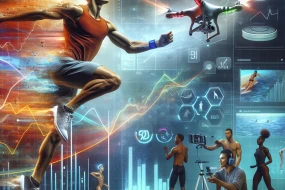
In today's digital age, technology isn't just about screens and video games—it's a powerful tool that can revolutionize how children engage with physical education. As educators and parents, we strive to keep kids active, healthy, and motivated to embrace fitness as part of their everyday lives. Integrating technology into physical education can bridge the gap between traditional methods and modern interests, making exercise both fun and effective. Let’s dive into the myriad of ways technology can enhance children's physical education, ensuring they stay active and engaged.
The Role of Wearable Technology
Wearable technology has become a game-changer in the realm of physical education. Devices like fitness trackers and smartwatches provide real-time feedback on physical activity, allowing children to monitor their performance and progress. These gadgets can track steps, heart rate, and even sleep patterns, offering comprehensive insights into a child’s physical health. For example, a PE teacher might use these devices to set personalized goals, encouraging students to reach a certain number of steps per day or to engage in a specific amount of active minutes. However, it’s crucial to ensure that these devices are used as motivational tools rather than sources of competition or anxiety.
Interactive Fitness Apps and Games
Interactive fitness apps and games are an excellent way to make physical activity exciting for children. Platforms like GoNoodle and Just Dance use engaging content and music to get kids moving. These apps often incorporate elements of gamification, where children earn points or rewards for completing activities, creating a sense of achievement and encouraging regular participation. The key is to select apps that are age-appropriate and align with the educational goals of the physical education program. Avoid apps that focus too heavily on competition, as this can discourage less athletically inclined students.
Virtual Reality: A New Frontier in PE
Virtual Reality (VR) offers immersive experiences that can transform physical education classes. Imagine students exploring a virtual jungle while learning about different types of movement or participating in a virtual soccer match. VR can introduce children to sports and activities that might not be accessible in their local environment, broadening their horizons and fostering a love for diverse physical activities. While VR is a powerful tool, it's important to manage screen time and ensure that the technology is used to complement, not replace, physical activity.
Online Platforms for Remote PE Classes
The COVID-19 pandemic highlighted the potential of online platforms in delivering remote physical education classes. Tools like Zoom and Google Meet, combined with instructional videos and live sessions, have allowed teachers to continue engaging students in physical activities, even from a distance. These platforms can be used to conduct virtual fitness challenges, yoga sessions, or even dance classes. To maximize effectiveness, teachers should ensure that instructions are clear and that activities are suitable for small spaces, accommodating students who may not have access to large play areas.
The Importance of Data-Driven Insights
Technology enables educators to collect and analyze data on student performance and participation. By using platforms that aggregate data from wearables and apps, teachers can identify trends and tailor their programs to meet the needs of their students. For instance, if data shows a decline in activity levels during certain periods, educators can introduce new activities or incentives to re-engage students. It’s essential, however, to handle student data responsibly, ensuring privacy and security are prioritized.
Incorporating Augmented Reality into Activities
Augmented Reality (AR) can enhance physical education by overlaying digital information onto the real world. Apps like Pokémon GO have shown how AR can encourage outdoor activity. In a PE context, AR can be used to create interactive treasure hunts or obstacle courses, making exercise feel like an adventure. When incorporating AR, it’s important to focus on activities that promote movement rather than just screen interaction.
Building Community Through Social Platforms
Social platforms can be leveraged to build a community around physical education. By creating private groups on platforms like Facebook or using apps like ClassDojo, teachers can share progress, celebrate achievements, and foster a sense of community among students and parents. This approach can motivate students to participate more actively, knowing they are part of a supportive network. However, educators should monitor these platforms to ensure they remain safe and positive spaces.
Challenges and Considerations
While technology offers numerous benefits, it also presents challenges that need to be addressed. One common mistake is over-reliance on technology, which can lead to decreased physical activity if not balanced with traditional exercise. Additionally, not all students have equal access to technology, which can create disparities. Educators should strive to provide alternative options and ensure that their programs are inclusive. Lastly, it's important to educate students about the responsible use of technology, emphasizing the importance of balancing screen time with physical activity.




























